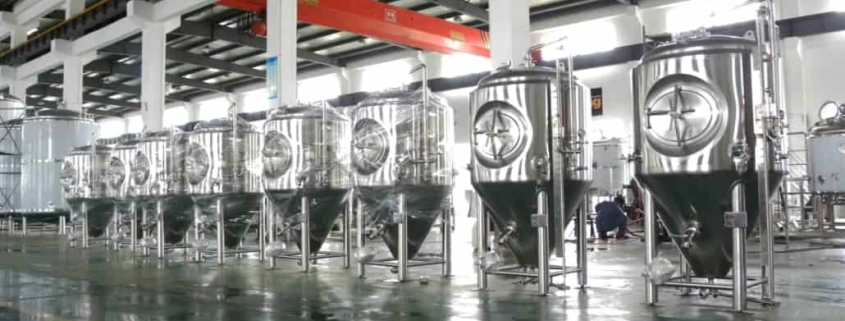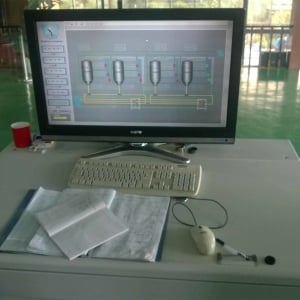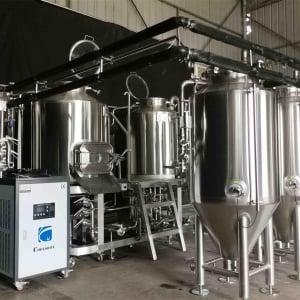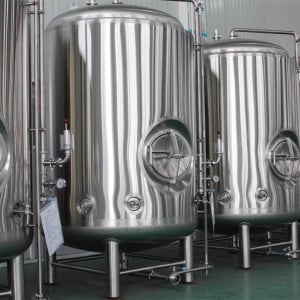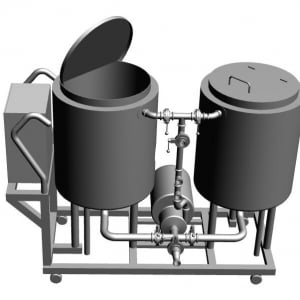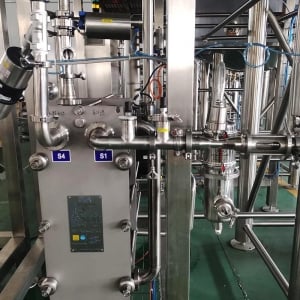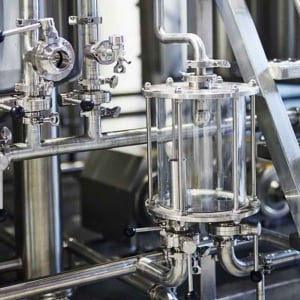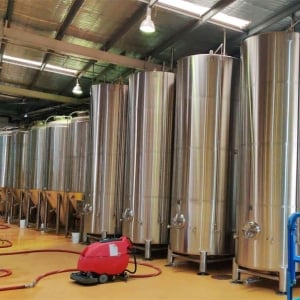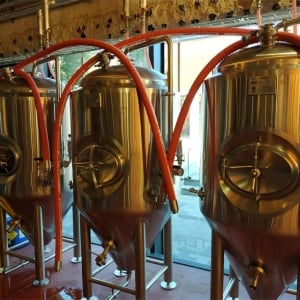1 BBL Mash Tun Guide
A 1 BBL Mash Tun is a critical piece of equipment for small to mid-sized craft breweries producing 1-3 barrels of beer per batch. This guide provides a detailed overview of 1 BBL mash tuns covering types, design, sizing, pricing, installation, operation, maintenance and how to select the right mash tun for your brewing needs.
Overview of 1 BBL Mash Tun
A mash tun is a vessel used in brewing to steep crushed malt grains in hot water to convert starches into fermentable sugars, producing the mash which gets lautered and sparged to create wort for fermentation.
Key details about 1 BBL mash tuns:
- Batch Size: Designed for 1 barrel (BBL) batches, typically 31 gallons
- Material: Usually stainless steel for durability and cleaning
- Insulation: Insulated to maintain temperature during mashing
- False Bottom: Perforated false bottom to separate grain from liquid
- Rakes: Includes internal rakes for stirring mash
- Sensors: Temperature and fluid sensors often included
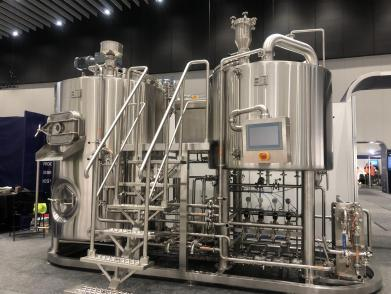
Types of 1 BBL Mash Tun
There are a few main types of 1 BBL mash tuns seen in craft breweries:
| Mash Tun Type | Description |
|---|---|
| Single Infusion | Basic mash tun for single temperature mash, lower cost |
| Stepped Infusion | Allows mashing at different temperatures in same vessel |
| Automated | Self-stirring, programmed temperature control and timing |
| Steam-Jacketed | Live steam heats mash externally through jacket |
The type of mash tun required depends on the brewing process, degree of automation and budget. Many craft brewers start with a basic single infusion mash tun and upgrade later as production increases.
1 BBL Mash Tun Design and Features
Key design elements, parameters and features to look for in 1 BBL mash tuns:
| Design Aspect | Typical Specifications |
|---|---|
| Material | Stainless Steel (304 or 316), all welded |
| Volume | 40-50 gallons (liquid capacity) |
| Dimensions | 24-30 inches diameter, 36-48 inches height |
| Insulation | 1-2 inch foam insulation with metal sheathing |
| False Bottom | Perforated stainless false bottom allows lautering |
| Rakes | Manually operated stainless steel rakes for mash stirring |
| Sensors | Temperature sensor, fluid level sensors |
| Controls | Optional digital temperature controllers |
| Customization | Custom dimensions and fittings possible |
Mash tuns can be customized with different materials, insulation thickness, sensors, motorized rakes and other options based on individual requirements. Lead times are typically 10-12 weeks.
1 BBL Mash Tun Pricing
Pricing for basic 1 BBL mash tuns starts around $4,000-5,000 but varies based on materials, features and brand. Typical pricing ranges:
| Mash Tun Type | Price Range |
|---|---|
| Basic Single Infusion | $4000 – $6000 |
| Stepped Infusion | $5000 – $8000 |
| Fully Automated | $8000+ |
| Steam Jacketed | $10,000+ |
Additional costs may apply for shipping, installation services, import taxes depending on location. Major mash tun equipment suppliers often provide quotes specific to your production brew house layout and process flow requirements.
Installation and Operation
Proper installation and operation ensures efficient performance and longevity of a 1 BBL mash tun system:
| Function | Procedure |
|---|---|
| Installation | Floor mounting or platform Connect plumbing, power, sensors Test heating, stirring, controls |
| Operation | Add grains, mixing water based on recipe Activate heating to hit mash temp target Stir mash thoroughly at intervals |
| Sparging | Recirculate wort until clear with pumps Gradually add hot sparge water |
| Cleaning | Remove spent grains completely Clean with caustic/acid process after use |
Consult manufacturer guidelines for wiring requirements, utility connections, troubleshooting and safe usage.
Maintenance of 1 BBL Mash Tun
Routine maintenance is vital for efficiency, sanitation and longevity of a mash tun:
| Frequency | Task |
|---|---|
| Weekly | Inspect sensors, seals for leaks Check insulation, fittings, fasteners |
| Monthly | Lubricate rakes, moving parts Test heating elements, controllers |
| Yearly | Replace gaskets, seals, sensors Inspect false bottom condition |
Establish maintenance logs, schedules and spare parts inventory based on daily/weekly usage and brewing frequency.
How to Select a Good 1 BBL Mash Tun Vendor
Key criteria for selecting a high quality mash tun equipment partner:
| Consideration | Evaluation Aspects |
|---|---|
| Quality & Durability | All stainless steel welded construction Good insulation rating Reputable material certifications |
| Feature Set | Sensors, rakes, customization options |
| Process Control | Sophisticated heating, automation capabilities |
| Turnaround Time | Quick fabrication and shipping times |
| References | Strong client references with proven experience |
| Service | Responsive support team and parts availability |
| Budget | Competitive transparent pricing |
Getting quotes from 3-4 suppliers on identical specifications and comparing on these criteria yields the ideal mash tun system for a given brewery. Site visits to vendors’ manufacturing facilities build further insight on production quality.
Pros and Cons of 1 BBL Mash Tun
| Pros | Cons |
|---|---|
| Affordable setup costs | Potentially slower batch brewing |
| Compact size takes less space | Manual operation can be labor intensive |
| Flexible customization | Prone to stuck mashes with poor stirring |
| Good temperature control | Consistent sparging requires expertise |
| Matches 1 BBL fermenters | Limited automation increases variability |
The affordability and compactness makes 1 BBL mash tuns ideal for small breweries starting out. Their operation requires in-depth brewing expertise particularly with sparging and temperature control to maximize yield and repeatability. Fully automated mash tuns reduce labor and variability but have much higher capital costs.
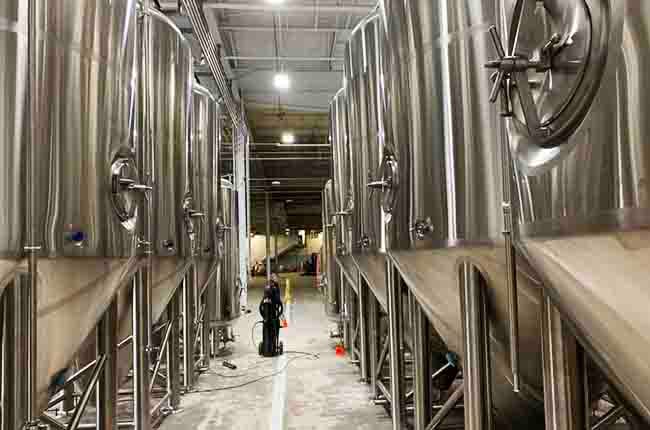
FAQs
Q: What size grist case or mill should I use with a 1 BBL mash tun?
A: A grist case with at least 1.25 – 1.5 BBL capacity allows room for sparging. Match the mill’s crushing capacity to your brewing frequency – a 2 roller mill producing 2000 lb per hour of coarse crush is typical.
Q: How much grain goes into a 1 BBL batch and mash?
A: Around 130-150 lb of grain is required per 1 BBL batch depending on the recipe and beer style. The mash tun must comfortably fit 15-17 lb per gallon.
Q: Should I insulate my mash tun?
A: Yes, insulation is highly recommended even for steam heated tuns to minimize heat loss and energy consumption. 1-2 inches of stiff foam insulation wrapped in metal sheets is typical.
Q: Can these mash tuns make different beer styles?
A: Yes, a kettle with good temperature control using single or stepped infusion mashing allows brewing different ale and lager recipes by hitting the required rest temperatures and times.
Q: What plumbing connections do I need?
A: Most mash tuns require 1.5-2″ ball valve connections for the hot liquor inlet, recirculation and wort knockout lines. Consult manufacturers for requirements.
Q: Should I buy imported or domestic mash tuns?
A: Both can offer quality solutions. Domestic provides shorter lead times and shipping cost benefits while imported often have lower equipment pricing for the same capability.

